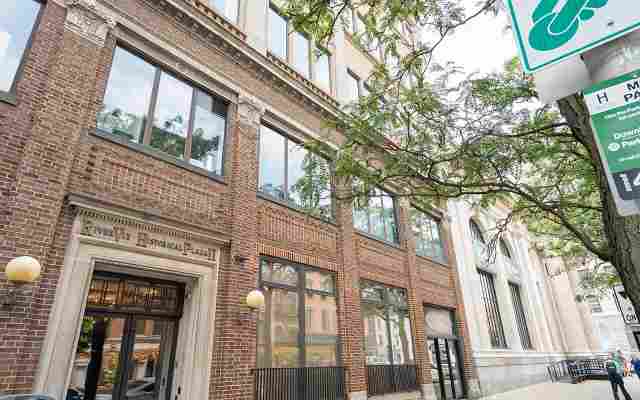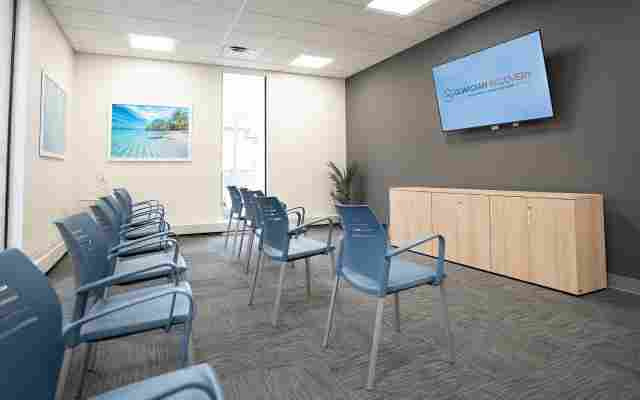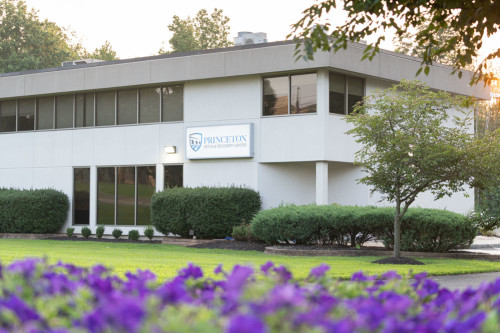
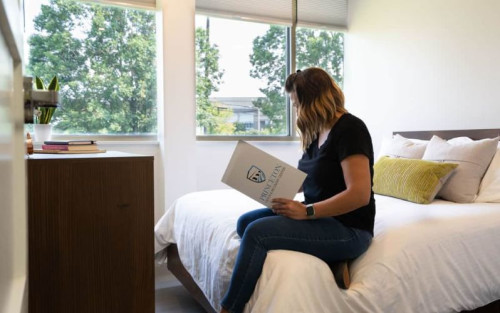
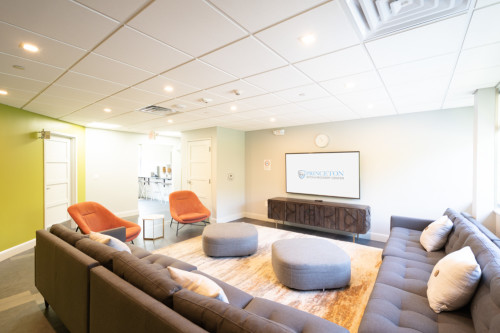
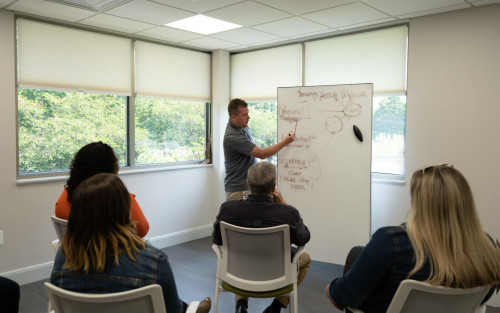
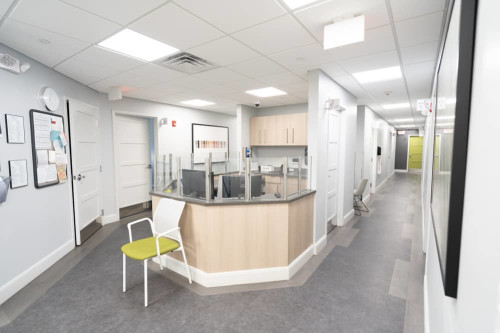




Princeton Detox & Recovery Center
This provider's information has been quality-checked by Recovery.com's Research Team for accuracy and completeness, including center verification through appropriate third-party organizations.
Treatment Focus
This center primarily treats substance use disorders, helping you stabilize, create relapse-prevention plans, and connect to compassionate support.
Primary Level of Care
Typically the initial stage of treatment for substance use, focusing on medically supervised management of withdrawal symptoms
Treatment Focus
This center primarily treats substance use disorders, helping you stabilize, create relapse-prevention plans, and connect to compassionate support.
Primary Level of Care
Typically the initial stage of treatment for substance use, focusing on medically supervised management of withdrawal symptoms
Provider's Policy
Princeton Detox & Recovery Center will contact your insurance provider to learn more about your benefits and how you are covered. Their Treatment Advisors will share all your insurance benefit information with you in simple language so you can understand exactly what your coverage includes.
Princeton Detox & Recovery Center
Princeton Detox & Recovery Center
About Princeton Detox & Recovery Center
Princeton Detox & Recovery provides medically monitored detox in a home-like setting. A typical stay times can last 6-10 days during which they offer medication-assisted treatment to help with withdrawal symptoms and to make detox as comfortable as possible. Nurses monitor detox 24/7. Princeton Detox & Recovery Center also provides optional individual and group therapy as well as aftercare support via referrals and connections to residential rehabs, sober living homes, and outpatient programs.
Comprehensive Evaluations And Care
Princeton Detox & Recovery Center begins treatment with medical, psychosocial, and psychological evaluations. These help their clinicians establish a safe and effective detox plan, and diagnose any underlying mental health conditions or trauma. Princeton also assigns each client a case manager. Their case manager oversees treatment, collaborating with the facility's clinical team, clients’ family members, and other treatment providers for a smooth handoff to continued care.
Evidence-Based Therapies
Once able, clients can attend individual, group, and family therapy sessions. Princeton Detox & Recovery uses evidence-based therapies like cognitive behavioral therapy (CBT) and dialectical behavioral therapy (DBT) with motivational interviewing techniques. They also teach clients and their families about relapse prevention, and educate all on addiction and the science behind it.
Detox in Comfort
Princeton Detox & Recovery Center welcomes clients into a comfortable, homelike environment during detox. They offer amenities like private rooms, wellness opportunities, and an on-site chef. Princeton Detox & Recovery Center also offers transport services for their tri-state area, or a sober escort who can travel with clients and offer support during the process.
What To Expect

Highlights from the Center
Highlights
These highlights are provided by and paid for by the center.
Customized Treatment Plans
Holistic Approach
Medically Assisted Detox
Certified Professionals
Center Overview
Treatment Focus
This center primarily treats substance use disorders, helping you stabilize, create relapse-prevention plans, and connect to compassionate support.
Joint Commission Accredited
The Joint Commission accreditation is a voluntary, objective process that evaluates and accredits healthcare organizations (like treatment centers) based on performance standards designed to improve quality and safety for patients. To be accredited means the treatment center has been found to meet the Commission's standards for quality and safety in patient care.

Insurance Accepted
Cash Pay Rates
Estimated Cash Pay Rate
Center pricing can vary based on program and length of stay. Contact the center for more information. Recovery.com strives for price transparency so you can make an informed decision.
More Guardian Recovery Locations
Recovery.com Verified Listing
Recovery.com verified that the name, location, contact information and license to operate for this treatment provider are valid and up-to-date.

Joint Commission Accredited

Licensed
Recovery.com is an independent, third-party mental health resource. Verification does not imply endorsement and does not guarantee the quality of treatment services.
Meet your care team

Amanda Hilzer
Executive Director
M.Ed, LCADC, CCS, ICAADC, CAADC

Martha Goldman
Director of Nursing
RN, BSN, MA, NBCC, LAC

Shane Stone
Director of Operations

Alece Breig-Hanley
Clinical Lead
MA, CAADC, CCS

Lauren Eichmann
Counselor
CRS

Nicole Salvetti
Counselor
LSW, MSW

Adrienne Buchanan
Counselor
LSW, MSW

Ryan Newman
Director of Admissions

Brianna Bricken
Admissions Manager

Sarah Babaa
Treatment Advisor/Concierge Account Manager
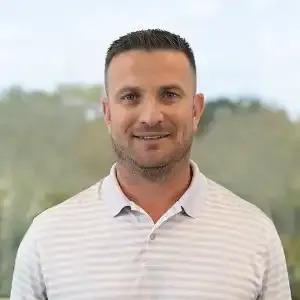
Michael Audette
Treatment Advisor

Chip Roy
Treatment Advisor




Treatment
Specializations
Alcohol
Using alcohol as a coping mechanism, or drinking excessively throughout the week, signals an alcohol use disorder.
Detox
Detox fully and safely removes toxic substances from the body, allowing the next steps in treatment to begin with a clean slate.
Benzodiazepines
Benzodiazepines are prescribed to treat anxiety and sleep issues. They are highly habit forming, and their abuse can cause mood changes and poor judgement.
Cocaine
Cocaine is a stimulant with euphoric effects. Agitation, muscle ticks, psychosis, and heart issues are common symptoms of cocaine abuse.
Drug Addiction
Drug addiction is the excessive and repetitive use of substances, despite harmful consequences to a person's life, health, and relationships.
Heroin
Heroin is a highly addictive and illegal opioid. It can cause insomnia, collapsed veins, heart issues, and additional mental health issues.
Opioids
Opioids produce pain-relief and euphoria, which can lead to addiction. This class of drugs includes prescribed medication and the illegal drug heroin.
Prescription Drugs
It's possible to abuse any drug, even prescribed ones. If you crave a medication, or regularly take it more than directed, you may have an addiction.
Who We Treat
Young Adults
Emerging adults ages 18-25 receive treatment catered to the unique challenges of early adulthood, like college, risky behaviors, and vocational struggles.
LGBTQ+
Addiction and mental illnesses in the LGBTQ+ community must be treated with an affirming, safe, and relevant approach, which many centers provide.
Men and Women
Men and women attend treatment for addiction in a co-ed setting, going to therapy groups together to share experiences, struggles, and successes.
Midlife Adults
For adults ages 40+, treatment shifts to focus on the unique challenges, blocks, and risk factors of their age group, and unites peers in a similar community.
Treatment Services
Detox
Detox fully and safely removes toxic substances from the body, allowing the next steps in treatment to begin with a clean slate.
Approaches
Evidence-Based
A combination of scientifically rooted therapies and treatments make up evidence-based care, defined by their measured and proven results.
Therapies
1-on-1 Counseling
Patient and therapist meet 1-on-1 to work through difficult emotions and behavioral challenges in a personal, private setting.
Meditation & Mindfulness
A practiced state of mind that brings patients to the present. It allows them to become fully aware of themselves, their feelings, and the present moment.
Family Therapy
Family therapy addresses group dynamics within a family system, with a focus on improving communication and interrupting unhealthy relationship patterns.
Medication-Assisted Treatment
Combined with behavioral therapy, prescribed medications can enhance treatment by relieving withdrawal symptoms and focus patients on their recovery.
Motivational Interviewing
Based on the idea that motivation to change comes from within, providers use a conversational framework to discover personalized methods for change.
Motivational Interviewing and Enhancement Therapy (MET)
This approach is based on idea that motivation to change comes from within. Providers use a conversational framework that may help you commit to recovery.
Nutrition Counseling
Nutritious food helps patients heal from within, setting them up for mental and bodily wellness as they learn about healthy eating.
Relapse Prevention Counseling
Relapse prevention counselors teach patients to recognize the signs of relapse and reduce their risk.
Relaxation Therapy
Muscle relaxation techniques relax mind and body. They can easily be practiced outside treatment, making it a valuable coping tool for continued recovery.
Substances We Treat
Alcohol
Using alcohol as a coping mechanism, or drinking excessively throughout the week, signals an alcohol use disorder.
Benzodiazepines
Benzodiazepines are prescribed to treat anxiety and sleep issues. They are highly habit forming, and their abuse can cause mood changes and poor judgement.
Cocaine
Cocaine is a stimulant with euphoric effects. Agitation, muscle ticks, psychosis, and heart issues are common symptoms of cocaine abuse.
Drug Addiction
Drug addiction is the excessive and repetitive use of substances, despite harmful consequences to a person's life, health, and relationships.
Heroin
Heroin is a highly addictive and illegal opioid. It can cause insomnia, collapsed veins, heart issues, and additional mental health issues.
Methamphetamine
Methamphetamine, or meth, increases energy, agitation, and paranoia. Long-term use can result in severe physical and mental health issues.
Opioids
Opioids produce pain-relief and euphoria, which can lead to addiction. This class of drugs includes prescribed medication and the illegal drug heroin.
Prescription Drugs
It's possible to abuse any drug, even prescribed ones. If you crave a medication, or regularly take it more than directed, you may have an addiction.
Synthetic Drugs
Synthetic drugs are made in a lab, unlike plant-based drugs like mushrooms. Most synthetic drugs are either stimulants or synthetic cannabinoids.
Languages
Aftercare
Experience
Personal Amenities
Amenities
Special Considerations
Activities
Yoga
Yoga is both a physical and spiritual practice. It includes a flow of movement, breathing techniques, and meditation.

Learn More About the Center
Take a Photo Tour
Browse Princeton Detox & Recovery Center’s photo gallery to see more of their facility and amenities.
Common Questions for Princeton Detox & Recovery
See answers to questions about stay times, costs, and more.
Staff Spotlight: Ann Hirschman
Princeton Detox & Recovery Center's highlights their advanced nurse practitioner, Ann Hirschman, and what her vast experience brings to Princeton.
Gratitude And Recovery
Princeton Detox & Recovery Center's details the importance of gratitude in addiction recovery.
What people are saying
Accommodations
Food & Nutrition
Treatment
Value
Pros
- Beautiful Location (8)
- Luxurious Accommodations (27)
- Excellent & Effective Treatment Programming (14)
- Friendly & Competent Staff (36)
See More
Dan P.
Chip E.
MC
DP
Anonymous
We love hearing about your treatment experience
Help individuals and families seeking treatment by sharing your first-hand experience with this treatment provider. Review Guidelines.










